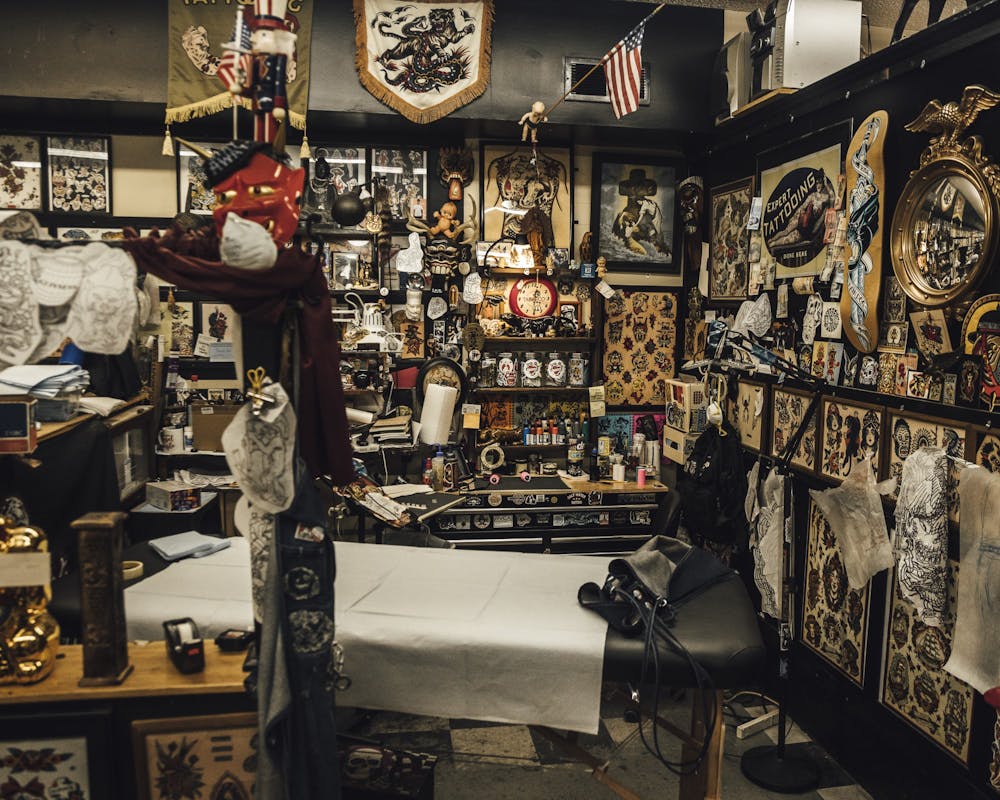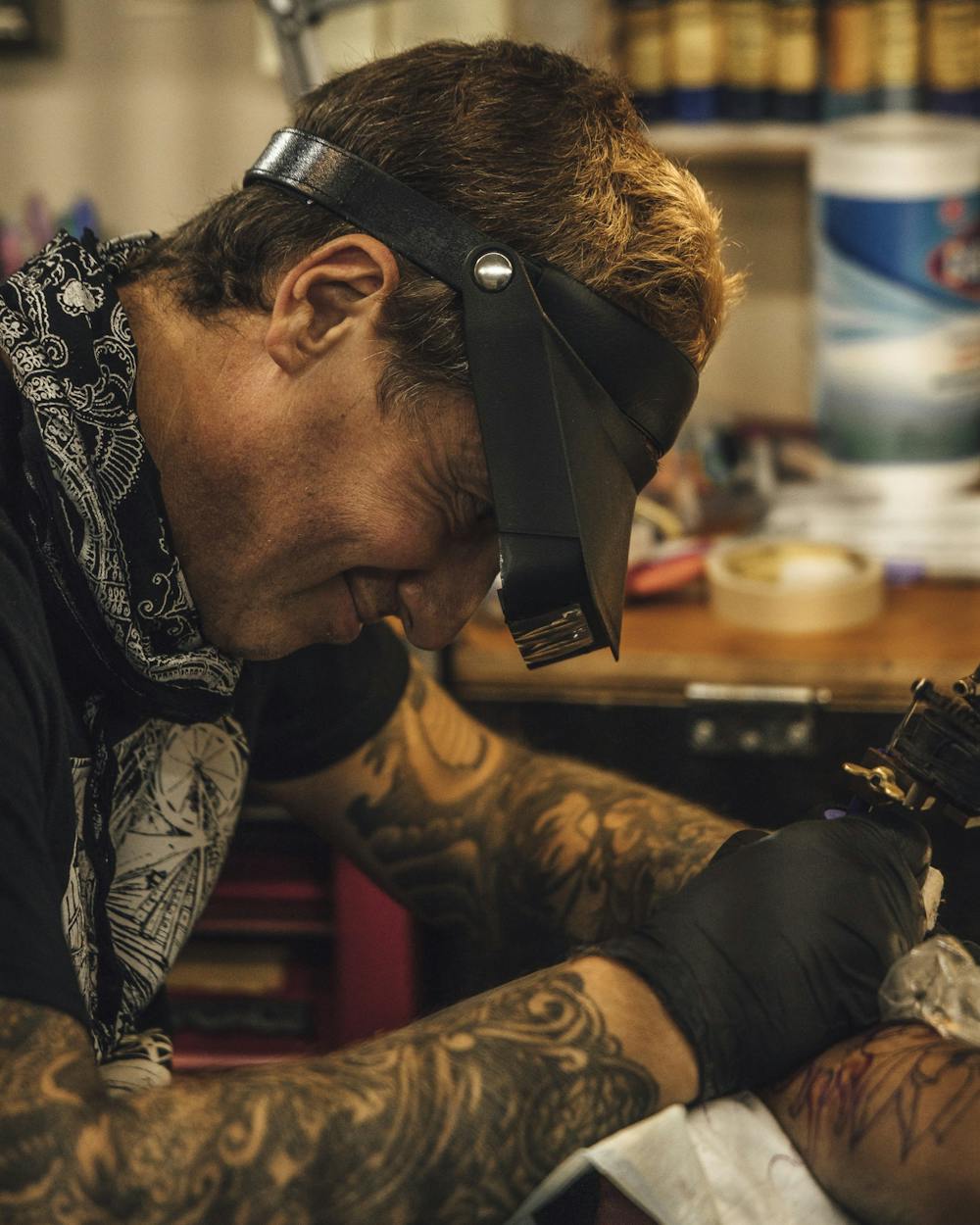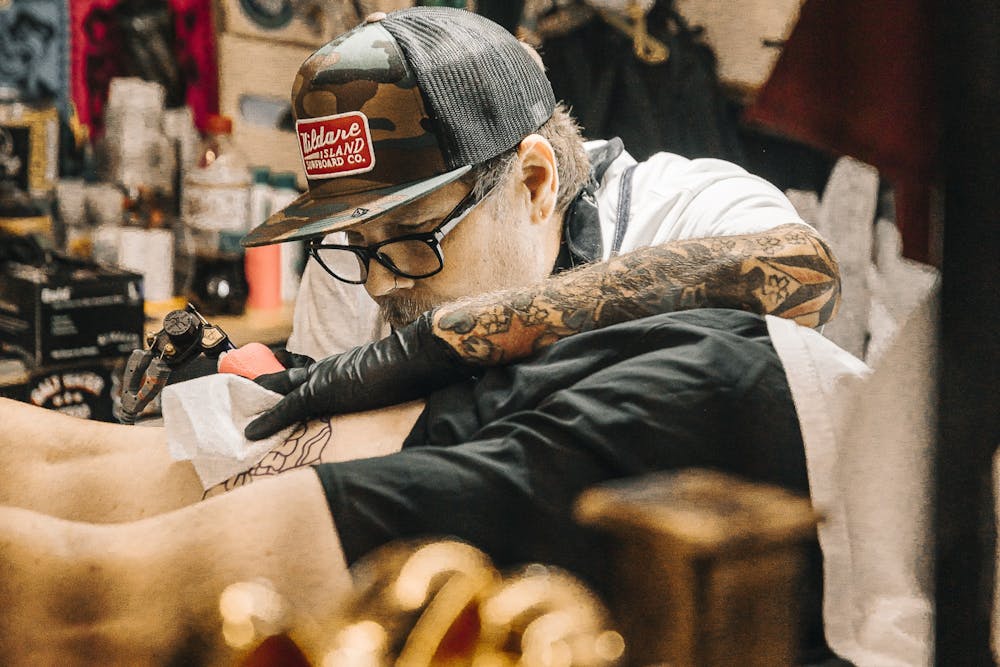Situated between Flora’s African Hair Braiding and The Music Store sits one of the oldest and most renowned tattoo shops in Columbia: Devine Street Tattoo. The black columns, bunted American flags in the windows and a vertical T-A-T-T-O-O sign are welcoming and recognizable as a shop steeped in tradition. Inside, I was greeted with a wall covered with painted flash sheets and comfortable couches.
The shop opened in 2008. In 2009, South Carolina passed a bill reducing the legal age to get a tattoo from 21 to 18. So, Devine Street Tattoo experienced the rise of millennials getting tattoos. Home to the University of South Carolina, Fort Jackson Army Base and a growing economy, Columbia attracts young people from all over the country. According to a Pew Research Study from 2017, 38 percent of young people ages 18 to 29 have at least one tattoo, which makes Columbia a prime location for tattoo shops.
Tattooing has not only become popular with younger generations, but it is more accepted by society as a whole. Shop Manager Dave Rash has been with Devine Street Tattoo for seven years and has practiced tattoo artistry for 11. He explains that people from all walks of life in the Columbia community come into the shop, especially police officers, firefighters, members of the military, and college students. “I’ve tattooed an 89-year-old lady before, for her first tattoo. You’d be surprised by some of the people that get tattooed,” says Rash.

Although tattooing has become more acceptable over time, there are still stigmas and legal restrictions to tattoo shops. They have to be 900 feet from a school, church or playground. Rash says while he could maybe understand the church restriction, the school and playground restriction doesn’t make sense, “it’s not like we’re going to go to a playground and tattoo some kids.”
Despite the restrictions, shops like Devine Street Tattoo still manage to be successful. Now open for 13 years, the shop has created a name for itself in the field of American Traditional tattooing. American Traditional, or Traditional Americana, is a style of tattooing that features saturated colors, a limited palate, 2-D shading and bold, black lines. American sailors and soldiers requested these designs in the early 20th century. The subjects often feature patriotic symbols like eagles, the American flag or symbols of women, like the iconic “gypsy woman” head.
Over the course of the 20th century, artists like Sailor Jerry and Don Ed Hardy further refined the style and facilitated its movement into mainstream society. Now, there are thousands of images that coincide with American Traditional and it is arguably the most popular and recognizable style in the United States. Many tattoo artists, including Rash, also say that this style tends to last longer. “I mean, tattoos last forever, but American Traditional is just so bold that at 50 years, you can still tell what the tattoo is,” Rash says.
Rash feels that something that separates Devine Street Tattoo from other shops is their commitment to long-lasting, quality tattoos for their clients. “We’d rather you have a good tattoo in 10, 15 years down the road than take your hundred dollars today,” explains Rash. Also, the artists at Devine Street Tattoo encourage clients to not get names of their significant others, “we’ll tell them, you might not be together in a month.” Furthermore, he emphasizes that they always refuse to do any racist tattoos or hate symbols like swastikas.

In addition to being proficient in American Traditional tattoos, the six artists at the shop have their own specialties and styles. Dave Rash (@daverash_dstattoo) says he can do any style except portraits, as he wasn’t trained in it. Jonathan Cheston (@vegan_avitar) does excellent Japanese, Kimi Kirchgessner (@pantherfist) does great lettering, Shannon Young (@shannonyoungtattoo) does vibrant neo-traditional, Kyle O’Neil (@kyloboneill) does realistic black and grey, and Bo van Boorom (@boknowsthat) does frightening horror tattoos.
Naman Bhala, a senior economics major at the University of South Carolina, got a tattoo from Jonathan Cheston at Devine Street Tattoo in September 2020. Bhala has two tattoos, one on his arm and one on his back. He got his first one, Chinese lettering, from Born Again Tattoo, and his second one, Sanskrit lettering, from Cheston. The Sanksrit tattoo reads “yada yada hi dharmasya glanir bhahuti bharat abhithanam adharmasya tadatmanam shrujyanmaham,” and is the summarizing Shloka of the Bhagavad Gita.
In Hindu tradition originating in India, the Bhagavad Gita is known as the manual of life and is a part of the epic Mahabharata. While there are over 700 shlokas (verses), Bhala’s tattoo is the summarizing shloka and translates to “Whenever and wherever there is a decline in religious practice, O descendant of Bharata, and a predominant rise of irreligion—at that time I descend Myself.”
Bhala says, “It was my birthday in September and it is my plan to get multiple tattoos in various languages.” Like many other college students, none of his tattoos are visible to people if he wears a shirt, and he doesn’t plan on getting any visible tattoos. He went to Devine Street Tattoo because he liked the tattoo his roommate had gotten from there. The process took 2 hours and cost $150, and Bhala is very happy with the result. “Jonathan was a good artist, he tattooed in a foreign text perfectly.” He plans on getting another tattoo this month from Devine Street Tattoo.
Bhala is one of many Columbia residents who have become patrons of the shop during the pandemic. The shop had to close down for a month at the beginning of the pandemic, but when it reopened, the artists were back to business. “It seems like once we opened the doors back up, it was so busy. People were getting their tax money and their stimulus money at the same time, so it was pretty crazy,” Rash says. He thinks the high volume could also be attributed to the boost of morale that getting a new tattoo offers. “With how it’s been during the pandemic, getting tattooed makes people feel normal.”

To those interested in getting a tattoo, Rash says that it’s important to go to reputable shops and artists that have had a traditional apprenticeship, and not ones that have just learned at home. Also, while the client has a responsibility to practice good aftercare, a well-trained tattoo artist should do tattoos that heal well, and don’t just look good right out of the shop. In the artists he hires, Rash looks for someone professional with a great portfolio who can do clean lines and solid color.
If you’re interested in becoming a tattoo artist, he recommends finding an apprenticeship. One way is to start getting tattooed at a local, reputable shop, establishing rapport with an artist and then requesting an apprenticeship. That’s what Rash’s current apprentice Jacob Benggio did. “I got tattooed by Dave for two years before, and then they needed somebody to work the desk, so I started working the desk. And then they offered me my apprenticeship, so I’ve been doing that for five months now,” says Benggio.
Rash and Benggio say that people interested in getting tattooed at Devine Street Tattoo should call to schedule an appointment or just come in, as they do walk-in appointments as well. Benggio emphasizes that it’s not scary or complicated. Just call or come in with a general idea, and they’ll help you out. Rash wants potential clients to know that the artists will do their best to create a great tattoo that heals well and lasts for a long time. Tattoo artists are talented professionals worthy of respect, and clients should listen to their suggestions. “We don’t have any problems with students or any people. As long as you’re cool, then we’ll be cool.”



